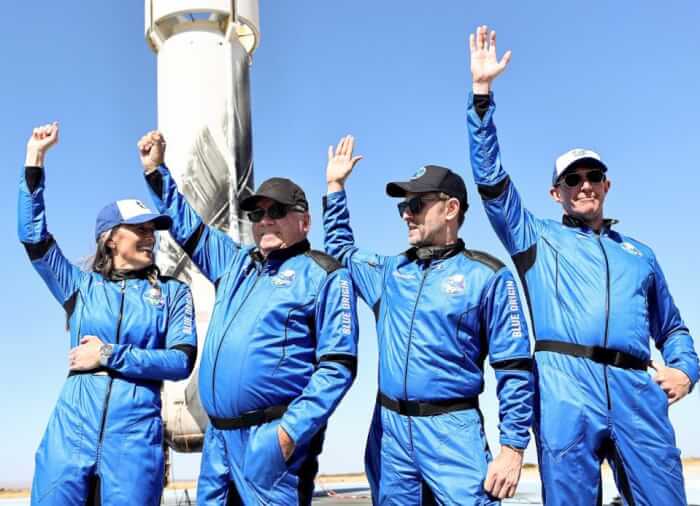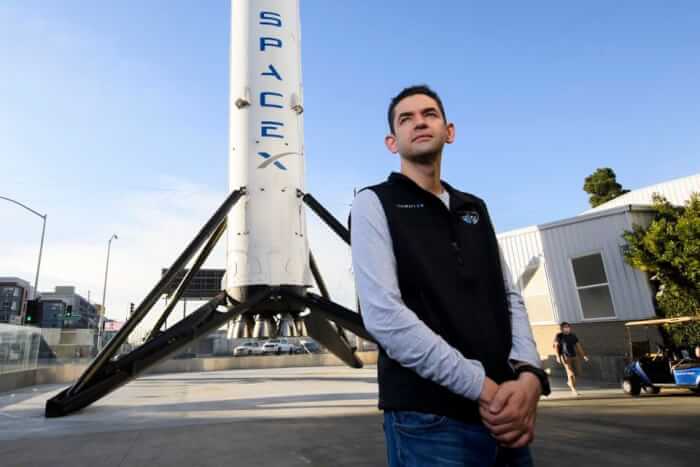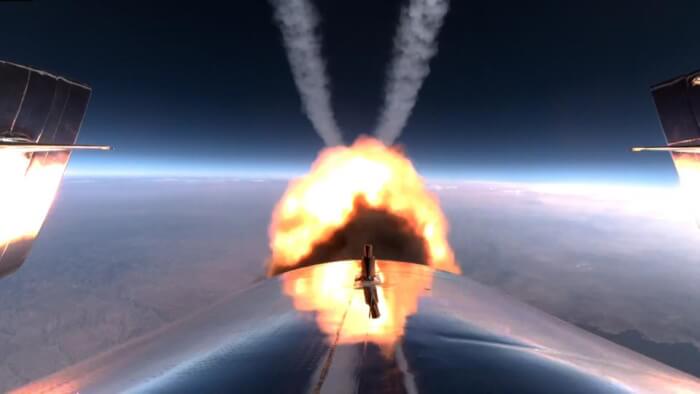Why Has The World Billionaires' Space Race Enraged The Public?
Some billionaires have spent 2021 preparing for their space flight. However, the growing public backlash against their luxuries could hold back the future of space tourism.
In a recent survey, more than three-quarters of people in the UK think the likes of Jeff Bezos, Elon Musk and Richard Branson "should focus their resources on problems facing Earth, like climate change, before space travel".
Bezos' Blue Origin rockets are estimated to generate 75 tons of emissions during each 11-minute flight, more than the average person generates during their lifetime. The company also said in 2018 that a trip by rocket costs between $200,000 and $300,000 per passenger.
Currently, no company has agreed to disclose their latest prices, including SpaceX, which successfully launched its first space mission after returning a group of tourists from a three-days flight in orbit this September.
Many people consider spending a huge amount of money, as well as burning too much carbon and other harmful emissions in the name of tourism, to be a callous act. “The billionaire class are out of touch with the problems facing the planet,” said Jordan Greenaway, director of Transmission Private, the brand management firm that conducted the study.
The wave of protests against space tourism began shortly after both Virgin Galactic and Blue Origin launched their first manned flights in July. “We’ve now reached stratospheric inequality. Billionaires burning into space, away from a world of pandemic, climate change and starvation... This is human folly, not human achievement,” said Deepak Xavier, head of Oxfam International's Global Inequality Campaign.
After this event, public opinion has become even tougher against space tourism, as shown in a recent survey by Transmission Private. This could adversely affect the future of space companies, such as Virgin Galactic, Blue Origin and a host of other startups that have launched in the background.
"This is a sentiment that could pave the way to more calls from the public for targeted climate taxes on the lifestyles of the wealthy individuals in the New Year," said the Greenaway director.
As a result, Virgin Galactic's stock has lost more than half of its value since the company's first flight in July. Branson even had to sell $300 million of his own stake in the business, and the next space flight has been postponed until next year.
Meanwhile, Blue Origin's stock cannot be publicly traded, although there were initially rumors that the company might go public through an IPO or SPAC.
But the 'rocket companies' are countering these reports and trying to prove to the world that they are "more professional". “There needs to be a purpose to it over and above just wanting to fly up high and look at the world,” said the Greenaway director.
Accordingly, Blue Origin says that in order to preserve the Earth, "we must go to space to tap its unlimited resources and energy." Meanwhile, Bezos' Amazon also just aired the documentary 'Shatner In Space', with William Shatner who conducted Blue Origin's spacewalk in October, praise the company's research mission.
In addition, Virgin Galactic also said its rockets are reusable and the company's goal is to try to "transform the current cost, safety and environmental impact of space-launch."
Tech billionaire Jared Isaacman says his trip aboard Inspiration4 raised money for St. Jude Children’s Research Hospital in Memphis. Meanwhile SpaceX, the company that successfully launched its first mission, has boasted that the company has bigger goals than that, including interplanetary travel.
“For some people this might be because they believe that investment in blue-skies high-end space tech will unlock innovation in other areas that could help us in new and different ways.”
For example, to Japanese billionaire Yusaku Maezawa, all these activities according to him are for the purpose of social development rather than technology.
Also on Monday, December 20, Maezawa returned to Earth after a 12-day trip aboard the Soyuz spacecraft to the International Space Station. The trip is a rehearsal for his trip to the moon on a SpaceX rocket in 2023.
Maezawa said he is looking for eight members of the public to join him on a trip to the moon. Candidates need to participate in "any activity" that "benefits others and society," the billionaire said in a video, adding that he paid for the entire trip.
H/T: Forbes
In a recent survey, more than three-quarters of people in the UK think the likes of Jeff Bezos, Elon Musk and Richard Branson "should focus their resources on problems facing Earth, like climate change, before space travel".
Bezos' Blue Origin rockets are estimated to generate 75 tons of emissions during each 11-minute flight, more than the average person generates during their lifetime. The company also said in 2018 that a trip by rocket costs between $200,000 and $300,000 per passenger.
 Source: Getty Images
Source: Getty Images
Currently, no company has agreed to disclose their latest prices, including SpaceX, which successfully launched its first space mission after returning a group of tourists from a three-days flight in orbit this September.
Many people consider spending a huge amount of money, as well as burning too much carbon and other harmful emissions in the name of tourism, to be a callous act. “The billionaire class are out of touch with the problems facing the planet,” said Jordan Greenaway, director of Transmission Private, the brand management firm that conducted the study.
The wave of protests against space tourism began shortly after both Virgin Galactic and Blue Origin launched their first manned flights in July. “We’ve now reached stratospheric inequality. Billionaires burning into space, away from a world of pandemic, climate change and starvation... This is human folly, not human achievement,” said Deepak Xavier, head of Oxfam International's Global Inequality Campaign.
 Source: Getty Images
Source: Getty Images
After this event, public opinion has become even tougher against space tourism, as shown in a recent survey by Transmission Private. This could adversely affect the future of space companies, such as Virgin Galactic, Blue Origin and a host of other startups that have launched in the background.
"This is a sentiment that could pave the way to more calls from the public for targeted climate taxes on the lifestyles of the wealthy individuals in the New Year," said the Greenaway director.
As a result, Virgin Galactic's stock has lost more than half of its value since the company's first flight in July. Branson even had to sell $300 million of his own stake in the business, and the next space flight has been postponed until next year.
Meanwhile, Blue Origin's stock cannot be publicly traded, although there were initially rumors that the company might go public through an IPO or SPAC.
 Source: Getty Images
Source: Getty Images
But the 'rocket companies' are countering these reports and trying to prove to the world that they are "more professional". “There needs to be a purpose to it over and above just wanting to fly up high and look at the world,” said the Greenaway director.
Accordingly, Blue Origin says that in order to preserve the Earth, "we must go to space to tap its unlimited resources and energy." Meanwhile, Bezos' Amazon also just aired the documentary 'Shatner In Space', with William Shatner who conducted Blue Origin's spacewalk in October, praise the company's research mission.
In addition, Virgin Galactic also said its rockets are reusable and the company's goal is to try to "transform the current cost, safety and environmental impact of space-launch."
Tech billionaire Jared Isaacman says his trip aboard Inspiration4 raised money for St. Jude Children’s Research Hospital in Memphis. Meanwhile SpaceX, the company that successfully launched its first mission, has boasted that the company has bigger goals than that, including interplanetary travel.
 Source: Associated Press
Source: Associated Press
“For some people this might be because they believe that investment in blue-skies high-end space tech will unlock innovation in other areas that could help us in new and different ways.”
For example, to Japanese billionaire Yusaku Maezawa, all these activities according to him are for the purpose of social development rather than technology.
Also on Monday, December 20, Maezawa returned to Earth after a 12-day trip aboard the Soyuz spacecraft to the International Space Station. The trip is a rehearsal for his trip to the moon on a SpaceX rocket in 2023.
Maezawa said he is looking for eight members of the public to join him on a trip to the moon. Candidates need to participate in "any activity" that "benefits others and society," the billionaire said in a video, adding that he paid for the entire trip.
H/T: Forbes
Share this article
Advertisement